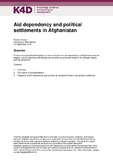| dc.contributor.author | Cooper, Rachel | |
| dc.coverage.spatial | Afghanistan | en |
| dc.date.accessioned | 2019-06-18T15:43:45Z | |
| dc.date.available | 2019-06-18T15:43:45Z | |
| dc.date.issued | 2018-09-14 | |
| dc.identifier.citation | Cooper, R. (2018). Aid dependency and political settlements in Afghanistan. K4D Helpdesk Report. Brighton, UK: Institute of Development Studies. | en |
| dc.identifier.uri | https://opendocs.ids.ac.uk/opendocs/handle/20.500.12413/14542 | |
| dc.description.abstract | Afghanistan is highly aid dependent. Aid dependency is defined as when aid comprises around 10% of GDP and when in the absence of aid the state fails to perform many of its core functions (Bizhan, 2018b, p. 1016). The World Bank (2018) estimates that international aid currently comprises 40% of Afghanistan’s GDP. Afghanistan is dependent on international aid to maintain state functions (Strand et al., 2017, p. 46). Donors have warned the Afghan government that aid levels will decline in the future. Aid levels are expected to approximately halve by 2030 (reducing from 40% of GDP to 20%). There is consensus in the literature that Afghanistan is aid dependent and also that it is sensitive to changes in international aid. For example, analysts agree that the slowdown in economic growth in 2013-2015 was due to the combination of declining international aid, the drawdown of international forces and the 2014 Presidential election. The literature reviewed for this report agrees that continuing international aid is needed to protect the gains made in Afghanistan since 2002. This is due to the low resilience of the Afghan state, which makes its economy and political system highly sensitive to shocks. Afghanistan is a fragile state and a number of reforms would be needed to help the state move towards self-reliance. However, literature searches for this report were unable to identify any projections concerning the minimum level of international aid needed to sustain the state’s ability to function. | en |
| dc.language.iso | en | en |
| dc.publisher | IDS | en |
| dc.relation.ispartofseries | K4D Helpdesk Report;428 | |
| dc.rights.uri | https://www.nationalarchives.gov.uk/doc/open-government-licence/version/3/ | en |
| dc.subject | Aid | en |
| dc.subject | Governance | en |
| dc.subject | Politics and Power | en |
| dc.title | Aid Dependency and Political Settlements in Afghanistan | en |
| dc.type | Helpdesk | en |
| dc.rights.holder | © DFID - Crown copyright 2018 | en |
| dcterms.dateAccepted | 2018-09-14 | |
| rioxxterms.funder | Department for International Development, UK Government | en |
| rioxxterms.identifier.project | K4D | en |
| rioxxterms.version | VoR | en |
| rioxxterms.funder.project | 238a9fa4-fe4a-4380-996b-995f33607ba0 | en |

